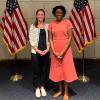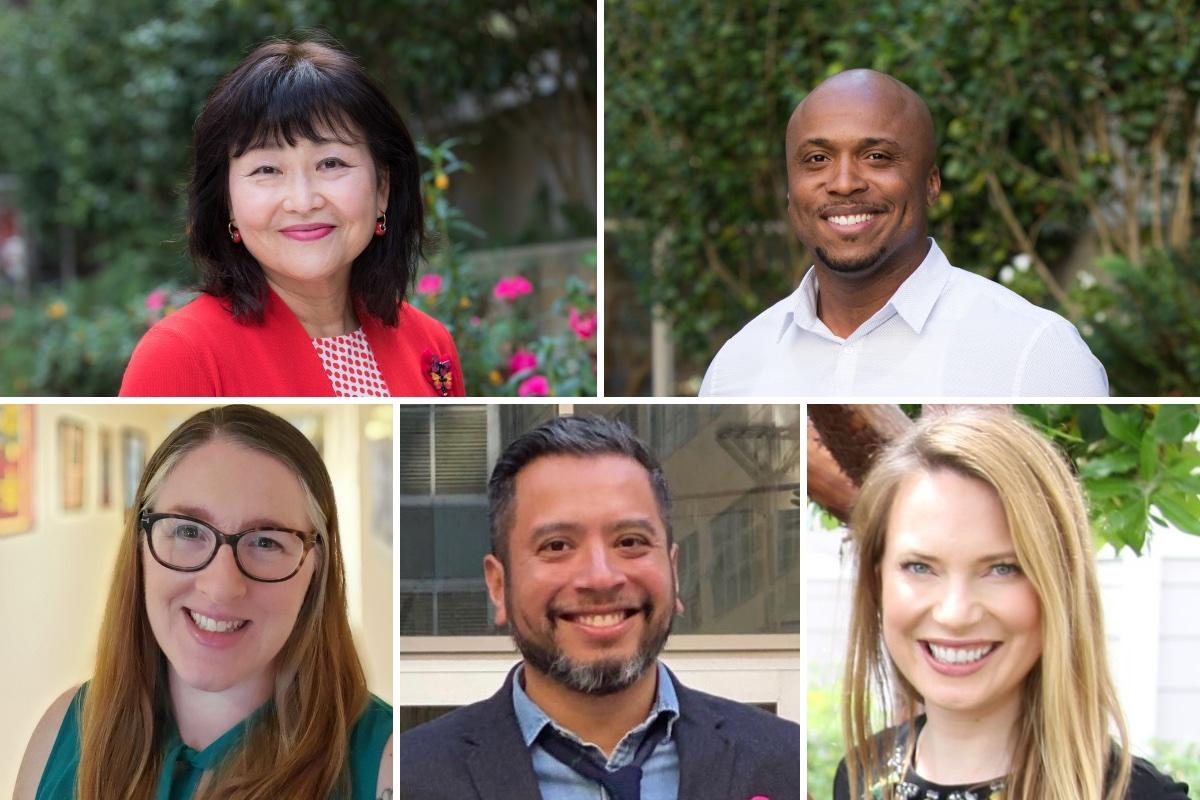
24 People to Watch in 2024
Improving health and health care requires innovation, persistence and passion. Meet 24 people to watch in 2024 from the UCSF School of Nursing who are leading the charge to champion health equity, shape health policy and change the way we think about health care.
Ifeyinwa Asiodu, PhD ’14, MS ’12, FAAN, associate professor and alumna
Ifeyinwa Asiodu is a national leader in addressing perinatal and infant health inequities, providing expert testimony at a White House panel and co-leading a multi-year project to improve care for NICU families. Through her work and research, she fights to reduce infant feeding inequities and increase access to human milk and donor human milk. Her research demonstrates the need for culturally informed breastfeeding care, lactation support and equitable family planning services for Black communities.
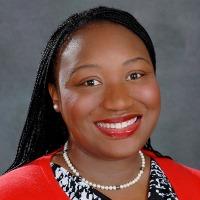
Asiodu serves on the National Academies of Sciences Engineering and Medicine’s ad hoc committee that is working to develop recommendations for the safe and ethical inclusion of pregnant and lactating persons in clinical research. Asiodu also leads the MILK Research Lab which works to improve perinatal health outcomes of Black families across the life course.
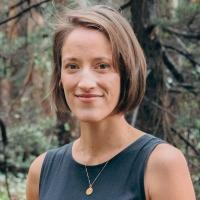
Kara Birch, DNP, PMHNP-BC, FNP-BC, associate professor
Kara Birch is committed to removing structural barriers to psychiatric care. A dual board-certified family nurse practitioner and psychiatric mental health nurse practitioner, Birch designed and launched a telehealth-based integrated mental health service at Golden Gate Obstetrics and Gynocology in San Francisco. The innovative program makes mental health care easily accessible to any patient seeking care there and has shown improvements in patients’ mental health outcomes.
Birch collaborates across the state to lead the University of California’s first Multi-Campus Psychiatric Mental Health Nurse Practitioner Certificate Program, which has prepared over 112 mental health providers across 27 counties to address the shortfall in California’s workforce. Birch has also impacted nurse education nationally through her leadership on the Veterans Affairs (VA) Nurse Practitioner Residency Curriculum Development task force, where she developed competency-based post-graduate curriculum for nurse practitioners and served on the VA Residency Diversity and Inclusion task force
Taylor Cruz, PhD ’18, alumna
A sociologist of science, technology and medicine, Taylor Cruz studies the impact of data analytics and emerging technologies – like artificial intelligence – on everyday life and health care. Her work seeks to grapple with today’s most pressing questions about the real-life impact of machine learning, and she has received accolades from both the American Sociological Association and the Society for the Study of Social Problems. An associate professor of sociology at California State University, Fullerton, Cruz leads research on Electronic Health Records integration, data analytics expansion in clinical settings, data as a tool for disease surveillance and redressing health inequities.
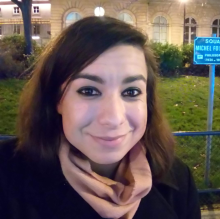
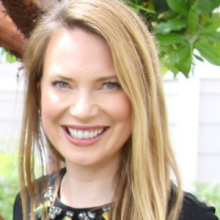
Melissa Fesler, DNP ’23, RN, FNP-BC, alumna
While studying in UCSF’s Doctor of Nursing Practice program, Melissa Fesler developed the first evidence-based preliminary diagnostic protocol for Morgellons disease — a poorly understood dermatologic condition associated with spirochetal infection. Morgellons disease is often misdiagnosed due to a lack of evidence-based diagnostic protocols, clinician knowledge and literature. Fesler designed a project to improve the perceived knowledge and confidence of clinicians in diagnosing Morgellons disease. Health care providers who received education on Fesler’s protocol reported an increase in knowledge of the disease and confidence in diagnosing it. Now, Fesler plans to conduct a systematic review to establish Morgellons disease in the literature, after which she will create guidelines for clinical practice.
Annesa Flentje, PhD, associate professor
Annesa Flentje has dedicated her career to reducing health disparities in the LGBTQIA+ community through prevention, increased visibility in research and improved health services. As the associate director of The PRIDE Study, she is part of a team leading a long-term national study with over 28,000 enrollees that strives to understand how being LGBTQIA+ affects an individual’s physical, mental and social health. As 2024 begins, Flentje is launching a five-year, first-of-its-kind study to compare the effectiveness of two treatments for post-traumatic stress disorder among sexual and gender minorities, which will help health providers better support their LGBTQIA+ patients.
In addition, Flentje is launching a new effort, backed by a five-year NIH grant, to mentor early-stage investigators from a range of disciplines, including hormonal biology and epigenetics, in improving LGBTQIA+ health.
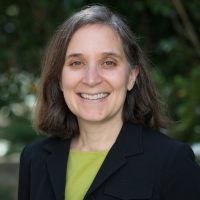
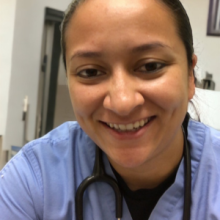
Amanda Fox, DNP ’23, FNP-C, alumna
Amanda Fox works at the Pentagon on a team that provides medical advising support to the Chairman of the Joint Chiefs of Staff. Fox is an active-duty family nurse practitioner who has served in the United States Air Force Nurse Corps for nine years. As her career progressed, Fox became acutely aware of a lack of nursing representation at the highest levels of leadership. She enrolled in UCSF’s Doctor of Nursing Practice program to change that and joined the Pentagon shortly after earning her doctorate. Fox’s work at the Pentagon includes evaluating evidence and best practices to provide accurate medical recommendations. She considers it a privilege to work with leaders in Washington D.C. to enact change in military medicine on a broad scale.
Yoshimi Fukuoka, PhD, RN, FAAN, professor
Yoshimi Fukuoka explores the power of AI to combat today’s urgent health issues. Fukuoka is developing a fully automated, AI chatbot to provide women with educational resources about heart disease — the leading cause of death in the United States. The chatbot shares resources tailored to the questions and health information submitted by the user.
In another project, Fukuoka is utilizing reinforcement learning — a type of machine learning — to personalize an individual’s weight loss program. The model is unique in that it incorporates changes in patients’ motivational states, allowing for prediction of an individual’s behavior in the program over time. In addition to teaching in the School of Nursing, Fukuoka is faculty in the new PhD in Computational Precision Health program, an innovative joint program offered by UCSF and UC Berkeley.
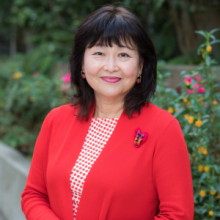
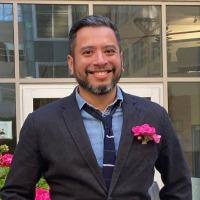
Jose Gutierrez, PhD, FNP-BC, AAHIVS, assistant professor
Jose Gutierrez’ work and research leverages new and emerging health system interventions to improve care for historically excluded populations. He strives to understand the needs and preferences of vulnerable populations to improve the delivery of sexual and reproductive health services and HIV/PrEP treatment and interventions. He is the associate program director of equity for the National Clinician Scholars Program at UCSF where he mentors postdoctoral researchers in their career path in health policy and systems change. He is also a co-investigator on a five-year, NIH-funded project exploring how reproductive telehealth services can be designed to be accessible and optimized for people of color, low-income people and immigrants.
Orlando Harris, PhD, MPH, FAAN, associate professor
Through his research and advocacy, Orlando Harris strives to develop culturally relevant interventions that advance the health of sexual and gender minorities. He published one of the first papers that delved into sexual violence among Jamaican men and transgender women. During the COVID-19 pandemic, Harris served on the COVID-19 Prevention Network’s expert peer review panel that was established by the National Institute of Allergy and Infectious Diseases, and was featured in Kaiser Family Foundation’s video campaign to provide the Black community with credible information about vaccines. Looking ahead to 2024, Harris will co-lead the new California Center for HIV Syndemic Policy Research that aims to expose the root causes of HIV and syndemic conditions and serve as a leading community-academic collaborative center that pushes boundaries in HIV policy and practice.
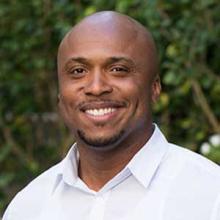
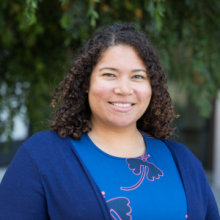
Jennifer James, PhD ’16, MS, MSW, associate professor and alumna
Jennifer James leads innovative bioethics research on patient-provider relationships and medical decision making within carceral settings. Much of her research explores women’s experiences of health and aging behind bars. Today, James’ research on the impact of forced sterilization programs conducted in California prisons is particularly timely. Survivors of state-sponsored sterilizations had until Dec. 31, 2023, to apply for a portion of the state’s $4.5 million reparation fund. She continues to raise awareness of the issue and work to ensure survivors receive compensation. James has been involved in the implementation of the new state law, including providing feedback to those administering it and assisting individuals who are applying for reparations.
Julene Johnson, PhD, professor
Julene Johnson’s research focuses on how music can promote health and wellness among older adults. She is the co-director of the Sound Health Network, a partnership between UCSF and the National Endowment for the Arts that is working to advance multidisciplinary research and public awareness about music’s therapeutic potential to improve people’s well-being across the lifespan. Music can change brain structure and brain function, resulting in cognitive, perceptual and psychosocial benefits — but its full promise is still being explored. Johnson is leading a five-year study on the impact of music improvisation on brain function and cognitive engagement of older adults, as well as a separate five-year effort to establish a multidisciplinary research network that will accelerate studies of music-based interventions for people living with dementia.
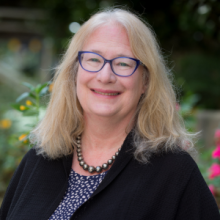
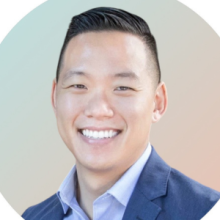
Joe Lee, MS ’18, alumnus
Joe Lee is founder and principal consultant of Community Health Synergy, a queer and Asian-owned consulting firm dedicated to advancing health equity through community-centered capacity building. Lee supports diverse community health organizations across the country on strategic planning, cross-sector partnerships, workforce development, health policy and more. Lee also serves as partner engagement manager for the Population Health Management Initiative. By implementing the latest evidence-based models of care, the initiative strives to improve quality of care and equitable health outcomes of people served by California community health centers. He is active in the UC Berkeley community as a lecturer in the Department of Ethnic Studies and an advisor for the Pipeline for AANHPI Community Health, which includes the Asian American Community Health Certificate program — the first undergraduate certificate of its kind nationwide.
Jenny Liu, MPP, PhD, professor
A health economist, Jenny Liu works to identify innovative, cost-effective and scalable interventions to improve maternal, neonatal and youth health in developing countries. Liu is leading four NIH-funded studies to explore whether community-based intervention, such as drug stores and loyalty programs that reward frequent shoppers, makes it easier to deliver sexual and reproductive services like HIV testing and contraception to adolescent girls and young women in sub-Saharan Africa. This includes a landmark collaboration among UCSF, UC Berkeley, Mzumbe University and the Ministry of Health in Tanzania to create the Mwotaji Clinical Research Center in Tanzania that will develop HIV interventions among adolescent girls and young women. In addition, Liu advises the World Health Organization, the World Bank, Ministries of Health and other organizations on health care access for vulnerable populations.
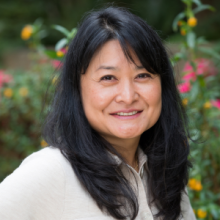
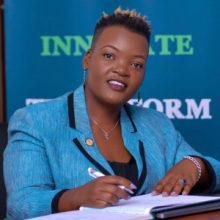
Schola Matovu, PhD ’17, MS ’14, alumna
Schola Matovu is an assistant professor and the interim director of Global and International Health at the University of Utah College of Nursing. Her foundational research explored the experiences and psychosocial well-being of Ugandan grandparent-caregivers for grandchildren affected by HIV/AIDS in Uganda.
Her current research is focused on alleviating injustices that stem from socioeconomic, gender and health inequalities by designing and testing culturally appropriate interventions that are tailored to the needs of marginalized grandparent-caregivers in rural Uganda and Utah. She is also the co-founder and executive director of Nurse-to-Nurse Global Initiative, a nonprofit whose mission is, in part, to empower and promote leadership and professional development of nurses, especially those in under-resourced settings.
Victoria Flores Michalchuk, PhD ’21, MS ’16, alumna
Victoria Flores Michalchuk is a nurse at the forefront of innovating and implementing new strategies and programs that improve workers’ health and well-being in the workplace. Her research and work are focused on creating work environments that promote healthy behaviors and positive health outcomes. She spent six years leading occupational health practices at Genentech and is now at Apple, where she leads a global team that manages occupational medicine programs and initiatives that address worker injuries and integrates health into building design standards. Outside of her work, Michalchuk is the president of the California State Association of Occupational Health Nurses.
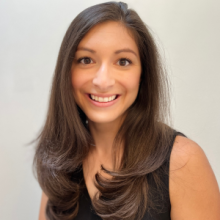
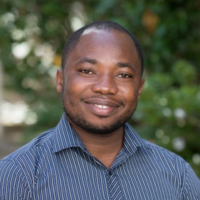
Jerry John Nutor, PhD, RN, FAAN, assistant professor
Jerry John Nutor is driven by a passion for improving health care for underserved populations, such as in sub-Saharan Africa. He has been the force behind multiple studies to assess and issue recommendations on how to strengthen health care providers’ preparedness, including during the COVID-19 pandemic.
Nutor founded and organizes the Africa Interdisciplinary Health Conference that brings together over 150 health care professionals annually to discuss best practices and effective strategies for quality patient care. In addition, he is Sigma Theta Tau International Honor Society of Nursing’s liaison to the United Nations. In September, he delivered a speech at the U.N. General Assembly about the need for U.N. member states to strengthen their health systems to fight tuberculosis and to invest in the nursing workforce for TB prevention and treatment.
Rachel Odes, PhD ‘21, RN, alumna
Rachel Odes is working to shed light on whether California’s nation-leading workplace violence prevention legislation, implemented in 2017-2018, is effectively reducing violence in the health care sector. Her study, which is nearly complete, looks at California health care workers’ compensation claims from 2013-2021, focusing on violence-related claims.
Odes was also a consultant to the Joint Commission, the non-profit agency responsible for accrediting health care organizations and programs nationwide, helping develop their workplace violence in health care standard, which went into effect in 2022. In California, she consulted with the Department of Public Health to provide the nursing perspective on its workplace violence prevention program. She is currently assistant professor at University of Wisconsin-Madison and is working to improve safety in hospitals and elsewhere across the continuum of care.
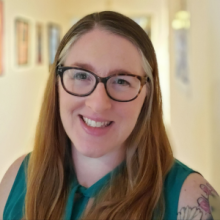
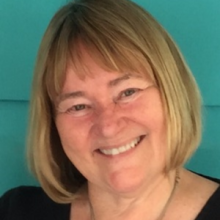
Kate O’Malley, MS, RN, GNP ‘84, alumna
Kate O’Malley is a leader in expanding palliative care in California. During her five-decadelong career, she helped establish palliative care programs in California’s public hospitals, developed resources to introduce palliative care in the community, and replicated On Lok’s landmark Program of All Inclusive Care for the Elderly nationwide.
Despite “retiring,” O’Malley continues to shape quality of care. She is a subject matter expert for California’s rollout of a new registry for Physician Orders for Life Sustaining Treatment forms, which documents the health care wishes of seriously ill people if they can no longer speak for themselves. She is also co-leading a multi-year evaluation to determine if a package of interventions designed by the Alzheimer’s Association lead to earlier diagnosis and treatment of Alzheimer’s disease in California’s community clinics.
Van Ta Park, PhD, MPH, professor
Van Ta Park is the architect of the CARE Registry — the first database of its kind nationwide — that seeks to facilitate meaningful inclusion of Asian American, Native Hawaiian and Pacific Islander (AAHNPI) communities in clinical research on dementia, aging, caregiving and other health topics. In 2023, the registry reached a major milestone, registering 10,000 AANHPI adults.
Park will build off that success in 2024. She has secured a federal grant for CARE 2.0, a project that will leverage earlier lessons to recruit another 10,000 AANHPI. Park will also lead another project, “Asian Americans and Racism: Individual and Structural Experiences (ARISE) study,” to examine the impact of multi-level discrimination and resilience resources on the risk for ADRD among older Chinese, Korean and Vietnamese Americans in California.
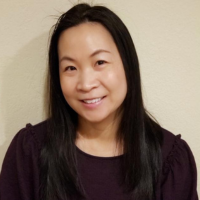
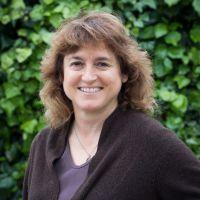
Elena Portacolone, PhD, MPH, MBA, associate professor
Elena Portacolone is working to improve access to essential services for older adults living alone with cognitive impairment both in the United States and globally. She works with policy makers to ensure that her research findings can be used in legislations aimed at expanding access to essential supports such as public home care aide visits to allow people living alone with cognitive impairment to age in place.
Portacolone is also working to increase representation of communities of color in clinical trials on dementia. In collaboration with the National Association of Hispanic Nurses, the National Black Nurses Association and the Alzheimer’s Association, Portacolone has implemented interventions to increase representation of Latinos and African Americans in clinical trials on dementia, focusing on interventions led by nurses of color and models that are easily replicated nationwide.
Glenn-Milo Santos, PhD, MPH, professor
Glenn-Milo Santos’ research focuses on developing pharmacologic and behavioral interventions to reduce alcohol and substance use. His 2022 study discovered that people who binge drink could benefit from taking the medication naltrexone before drinking — a key finding that could reduce alcohol-related deaths and has been featured in The New York Times, Good Morning America, and other new outlets.
In 2024, Santos is leading eight federally funded studies, including one that aims to better understand binge drinking using biosensors to detect drinking in real-time, and one that explores whether naltrexone can be reduce methamphetamine use. Santos is also co-leading a new program at UCSF called Next Generation Nurse Scientists Ending the HIV Epidemic, which will train a diverse cadre of nurses in research methods to support efforts to end HIV.
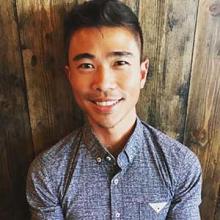
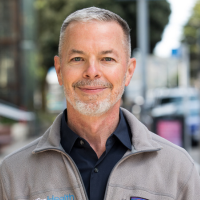
Matt Tierney, MS, NP, FAAN, professor
Matt Tierney is a nationally recognized expert on substance use disorders. As the medical director of inpatient substance use management at UCSF Health, Tierney leads efforts to improve the quality of care for patients with substance use disorders and unhealthy substance use. He helped create and currently leads the hospital’s addiction consult service, which serves as a centralized resource that connects UCSF clinicians with experts who specialize in substance use disorders, enabling them to better assess and treat in-hospital patients.
Tierney also provides education on substance-related issues to the full range of multi-disciplinary clinical providers at the medical center; develops community partnerships; and designs institutional modifications that support the identification and treatment of patients with problematic substance use.
Laura M. Wagner, PhD, RN, FAAN, professor
Laura M. Wagner leads innovative research to improve patient safety and delivery of care within geriatric settings. She is conducting a multi-year study to improve the health outcomes of skilled nursing facility residents diagnosed with Alzheimer's disease or related dementias and the work environments of nurses that provide their care. Wagner founded UCSF’s FirstGenRN program. The first program of its kind in the nation, FirstGenRN identifies students who are the first in their family to go to college and provides them with mentoring and support to help them succeed.
Wagner also helps to lead an innovative partnership between the School of Nursing and UCSF Health. Alongside Christine Miaskowski and Sandy Staveski, Wagner is spearheading initiatives to bridge academic research and clinical practice and to advance nursing scholarship across the health system.
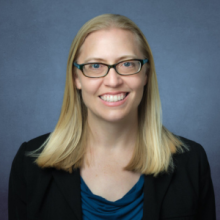
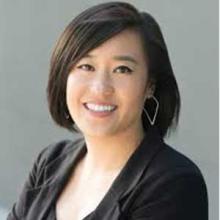
Jarmin Yeh, PhD, MPH, MSSW, associate professor
Jarmin Yeh investigates social justice issues that impact the quality of life of older adults, people with dementia and their caregivers. She is implementing and evaluating a training program in California to equip In-Home Supportive Services caregivers with the skills they need to provide quality care while ensuring they also practice self-care to be able to thrive in a role that can be emotionally challenging. This year, she is engaged in three studies to improve caregivers’ resiliency as well as the Age-Friendly Health Systems initiative that seeks to implement a set of evidence-based practices into how care is delivered to older adults.
Yeh is also co-director of the UCSF Emancipatory Sciences Lab, which works to advance knowledge and the realization of dignity, access, equity, healing and social justice.

